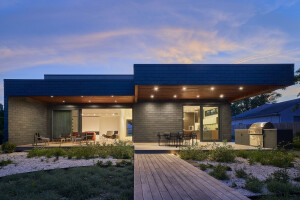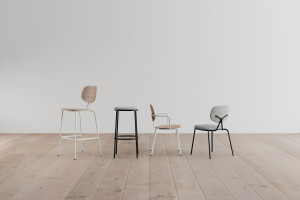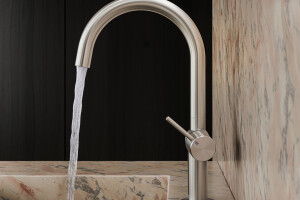PFU (place for us) in Belgrade, Serbia is a modern creative coworking space for creative individuals in search of an inspiring professional environment and looking to develop creative networks and collaborations.

The main idea of the PFU (place for us) coworking concept was to create a space that didn't resemble an office. It was meant to be a place in the very center of the city where a person can come and feel like they are in a cozy café, a quiet library, or a creative salon. The goal was to avoid standard emotionally detached office solutions.

The coworking space is located in a Yugoslav office-administrative building built in 1952. Therefore, when creating the atmospheric code of the project, our starting point was the aesthetics of the 1920s in Yugoslavia.

For example, it was during that time that wooden wall paneling began to be widely used in public spaces, fabrics were chosen with reference to dense tweed, and globe-shaped lamps typical of that time found their place as wall fixtures. During construction, we removed the existing linoleum flooring and discovered a granite floor, which after cleaning became a fundamental part of the design. In this way, we preserved the original historical material to enhance the aesthetics of Yugoslav times.

One distinctive architectural feature of the space is a fully glazed wall that overlooks a busy street and park. The coworking space is connected to the dynamic urban landscape, which is an integral part of the interior.

We also removed suspended ceilings and all cladding, revealing the structural framework of the building for people inside the coworking space to see. The removed suspended ceiling and exposed communications show the true volume of the space.
The compositional center of the space is a cubic volume highlighted with natural oak finish. This adds warmth of natural materials and makes a reference to the design of Yugoslav interiors from the time of building construction.

Additionally, the wooden cube serves multiple functions: bench area in the kitchen, wardrobe system, niche for electrical panels and all communications, ventilation communication box, library zone, printer area, storage room, and even a one-person office for conducting Zoom meetings or focused quiet work.
The space has several main zones:
1) Openspace with open desks divided into small groups with plants, additional coziness provided by desk lamps.
2) Coffee-point where the kitchen area is connected to the working area with a communal soft bench and café-style seating at tables. The kitchen also includes a hidden door to the restrooms.

3) Meeting room - the separate meeting room with decorative volumetric plasterwork, a large wooden table. The room is separated from the main space by glass partitions, and a soft semi-transparent curtain can create a more private atmosphere during meetings.
4) Lounge area in the scenic corner with sofas, armchairs, and a mirrored ceiling that allows the view from the window to penetrate further into the space and blur the boundary between them. This solution was also used due to the massive engineering systems in this area that significantly lower the ceiling height. To balance proportions and provide comfortable seating on the sofa, a mirror is used to turn the room's shortcomings into advantages.

Materials in the project are natural and organic: stone, concrete, wood, exposed metal, lime plaster were also chosen to create a sense of naturalness, nature, and ecological friendliness.

































